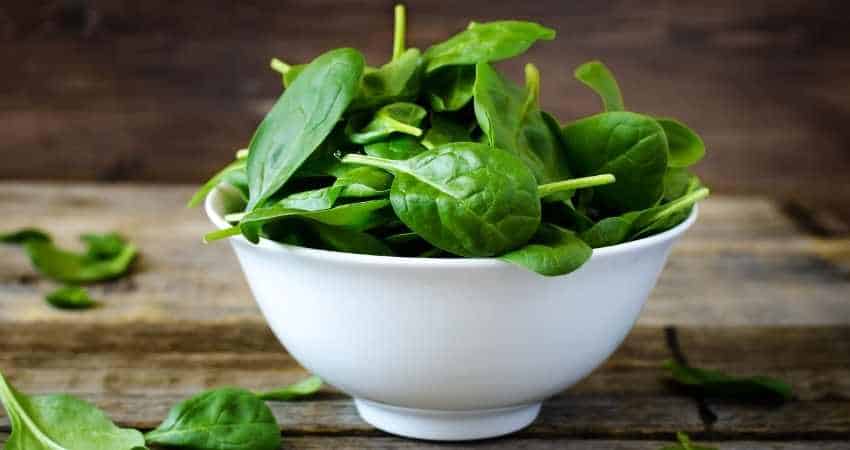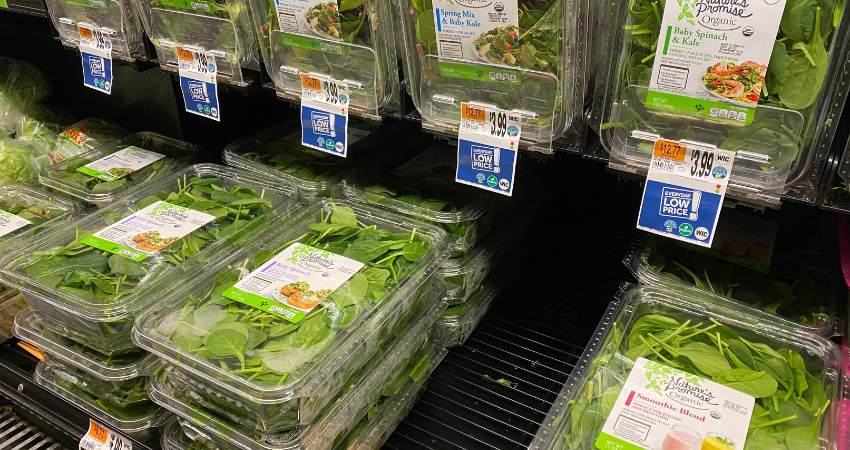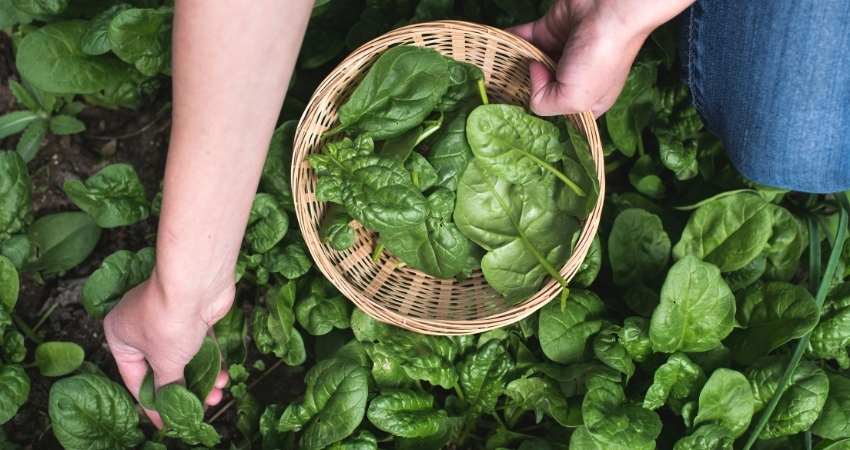Organic Spinach vs. Regular Spinach: What’s the Difference?
As a Certified Health Coach many people ask me about the difference between organic and regular spinach.
Organic spinach is produced using farming methods that promote and protect the environment, recycle resources, and limit the use of pesticides and fertilizers. In general, spinach is very healthy, but regular spinach ranks high in the list of vegetables with the highest amount of pesticides.
In the course of this article, you’ll learn the main differences between organic and regular spinach. In addition, you will find out:
- The benefits of consuming organic spinach
- The downsides of both spinach types
- Why you might want to buy non-organic spinach
- Which option is healthier for you?
- Tips on how to get the most from your spinach
What Is Organic Spinach?

In addition to coaching my clients about spinach, I purchase and consume it almost every day. Therefore, I have researched this topic in the past and present. Let’s take a close look at both types.
Organic spinach is 100% natural. Such spinach is grown as per the 1990 Organic Foods Production Act (OFPA)1. The act aimed to set up a national standard for the production, handling, and processing of organically grown foods.
Organic spinach grows without using artificial or synthetic fertilizers, pesticides, or herbicides. As a result, it does not contain pesticide residues like regular spinach. When it does, it’s usually natural pesticides and fertilizers like animal manure rather than synthetic.
Also, spinach farmers use traditional earth-friendly farming techniques that guarantee organic authenticity. Such farming practices enhance soil quality, reduce pollution, and help conserve groundwater.
Organic spinach is full of delicious flavor. Most people prefer organic spinach to regular spinach due to its great taste, health benefits, and concern for the environment. You can have it as a salad, steamed, braised, or add it to your soups.
Pros and Cons of Organic Spinach
Is organic spinach healthier, tastier, or even safer than regular spinach?
Let’s try to answer these questions by having a look at the benefits of organic spinach:
Pros of Organic Spinach
Provides Your Body With Many Health Benefits
Some of these include lowering the risk of some diseases, cholesterol, and age-related eye ailments. In addition, its phytonutrients act as anti-inflammatory agents, while its calcium and Vitamin D help promote bone health. As you can see, including spinach as part of your regular diet is highly recommendable.
Contains Fewer Pesticides Than Non-Organic Spinach
This is because pesticides used in organic farming are natural-based, resulting in healthier produce. On the other hand, pesticides used in non-organic spinach are in direct contact with the leaves you consume.
Buying and consuming organic spinach may help reduce the number of pesticides, chemicals, and drug-resistant bacteria like salmonella and E. coli you get exposed to2.
High Nutrient Content
While studies to prove this have been inconclusive, organic spinach may contain significantly more nutrients such as iron, vitamin C, and magnesium than conventional spinach3. It also retains much lower amounts of heavy metals such as cadmium, lead, and mercury.
Interestingly, eating vegetables rich in calcium and iron – like spinach – helps reduce the accumulation of these heavy metals in your body.
High Levels of Antioxidants
Organic spinach might have higher levels of antioxidants than regular spinach. The reason behind this could be that organic foods rely on their protective compounds – antioxidants – rather than chemical pesticides.
These antioxidants are beneficial as they may help lower the risk of chronic diseases and fight free radicals.
It Is Very Versatile
You can use organic spinach in salads, smoothies, soup, curries, or add it to pasta dishes and stir-fries. You can also use it in your pestos, add it to wraps, or sauté it on its own with olive oil.
Furthermore, its insoluble fiber helps keep you feeling full for a long time, making spinach a good option if you are trying to lose weight.
It Favors the Environment
The farming methods used in growing organic spinach promote environmental sustainability and help protect it for future generations.
Cons of Organic Spinach
- Organic spinach is pricey. Therefore, many people find it a challenge to buy organic all the time.
- It spoils faster than regular spinach. This may cause you to make numerous trips to the grocery store, especially if you don’t own a fridge. In the long run, this is expensive. Still, with the correct temperature and moisture, your organic spinach can keep for up to 10 days.
- Some people might lack easy access to organic spinach. They might thus resort to eating fewer quantities of spinach in the long term.

Should You Buy Organic Spinach?
The overall safety of organically grown food has been a subject of debate over the years. Some studies have discovered that organic foods contain low levels of bacteria contamination. Yet, others indicate that the level is higher than in regular produce.
As mentioned earlier, spinach falls second in the Environmental Working Group’s ( EWG) Dirty Dozen list4. The list features 12 of the dirtiest vegetables and fruits containing the most pesticides.
While the presence of pesticides doesn’t automatically lead to adverse health effects, the EWG’s concern was over the results of the 2015 USDA (United States Department of Agriculture) spinach samples tested5. You see, up to 71% of the samples from conventionally grown spinach contained permethrin.
This pesticide is not only banned in the EU, but the EPA also considers it a weak carcinogen6. High doses of the pesticide can lead to tremors and seizures.
Still, the USDA notes that low levels of permethrin in foods are safe, and all the spinach samples were within the safe amounts. Also, most of the pesticides found are legal and safe to use. Yet, some samples surpassed the legal limits set for certain chemicals while others contained chemicals banned by the Environmental Protection Agency, EPA like DDT.
So, if you’re wondering whether organic spinach is worth the higher price tag it commands, the answer is yes. The newest Dirty Dozen list from EWG still has spinach at number 2. Besides, one spinach sample indicated a presence of almost 18 pesticide species! Furthermore, the organization recommends organic produce as the best food choice.
Nevertheless, the amount of pesticides found in non-organic spinach is not very significant7. Indeed, you’d need to consume a substantial amount of spinach to cause you real harm.
Additionally, the purpose of this shopper’s guide is to offer you information so that if you wish to limit pesticide exposure, you can then choose to go for organic produce.
Therefore, the choice of buying organic should be based on your preference, values, and affordability. I wrote a blog post on spinach alternatives, you may want to find out what else you can use by clicking here, 5 Best Alternatives for Spinach When Cooking.

How Do You Know You’re Buying Organic Spinach?
When buying organic produce, look out for the USDA organic seal8. For vegetables, the term “organic” will be showing on the sign on top of the vegetable display. Note that this term is strictly regulated for agricultural produce and for organic spinach; this is the mandate of the National Organic Program (NOP).
The USDA has put in place an organic certification program to ensure that farmers selling organic produce fulfill strict requirements9. However, some unscrupulous traders may try to pass off their produce as organic, so you need to be extra careful when making your purchase.
Another way to confirm the authenticity of organic spinach is to check for the Price Lookup (PLU) code on the checkout sticker. This code has a 5-digit number, which indicates that the spinach is organic, and a 4-digit number for non-organic spinach.
Finally, if buying from local farms, inquire from the farmer about their farming practices, how they manage pests, whether they use chemicals or not, and if they use natural fertilizers. Nevertheless, look out for trading firms that may be involved in “greenwashing”- using fake organic-friendly terms like “farm-raised” on the packaging of their non-organic produce.
These traders try to cash in on the “buy organic craze” and might confuse you as you try to figure out what is really organic. It might thus be easier to buy your organic spinach at whole food markets or coops where you can get answers to any questions you might have. It’s also cheaper to shop from here as there are no brokers.
Find out if raw or cooked spinach has more nutrients in my article, Raw Spinach vs Cooked Spinach: Which is Better? A Comparison.
Conventionally-Grown Regular Spinach
Lots of people have consumed regular spinach for years with no adverse health effects. Therefore, there is nothing wrong with eating regular spinach, nor does this predispose you to ill-health. All the same, regular spinach still has its good and bad sides.
Below are some of the pros and cons of non-organic spinach:
Pros of Conventionally-Grown Spinach
- It is more affordable than organic spinach. Regular spinach is widely available and also very easy on the pocket. This is because the farming methods used result in higher yields, minimal losses from insect damage due to the use of insecticides, and longer shelf life. As such, almost everyone can afford to buy this staple vegetable.
- It still contains all the healthy vitamins and nutrients found in organic spinach. There is, therefore, no reason to fear eating regular spinach as this can stop you from consuming food that could benefit your diet.
- Regular spinach is consistent in terms of taste and quality. You always know what to expect from your bunch, which also helps to reduce wastage.
- It helps to promote local food producers. Buying spinach from local farmers, e.g., at the local food market, helps to boost their business. It also ensures you get healthy produce because, with no need to store the produce for long, the farmers do not use high-level pesticides.
Find out if collard greens have more nutrients in my article, Collard Greens vs Spinach: Which is Better? A Comparison.

Cons of Conventionally-Grown Spinach
- It contains a lot of pesticides due to the chemicals used on the farm. The spinach leaves are quite broad, allowing them to hold pesticides. So, ensure that you wash your spinach very well before you consume it.
- The chemicals used remain in the soil. These deplete the number of nutrients and carbon in the soil. Carbon is essential as it aids soil aeration and the soil’s capacity to hold and absorb water. When this capacity reduces, fertilizers get leached from the soil into waterways and the ocean. A vicious cycle results as more and more pesticides and fertilizers are necessary for growing food.
While organic spinach farming is more friendly to the environment, today’s conventional farming is also doing its part to ensure that consumers lead quality lives. To this end, more and more farmers are now using pest management systems that are more suited to the protection of both human health and the environment.
Find out if spinach is better than lettuce in my article, Spinach vs Lettuce: Which is Better? A Complete Comparison.
Why You Might Want to Buy Non-organic Spinach
Did you know that you can buy organically grown spinach from farmers’ markets or supermarkets that buy local produce? Unfortunately, the produce is not technically referred to as organic because it is not certified.
This is because it’s often impossible for many of these small-scale farmers to certify their farms as organic due to the considerable inspection costs involved. Hence, they have no way of proving that no chemicals were used in growing their produce.
Buying from local farmers also means that you get fresher produce since it has undergone less travel and storage.
Secondly, scientific studies are yet to confirm that there’s a significant advantage, if any, to avoiding pesticides by eating organic spinach. While consuming organic spinach might lower your exposure to pesticide residues and bacteria, there is no strong evidence linking organic spinach to higher nutrition levels10.
Find out how spinach compared to arugula in my article, Arugula vs Spinach: Which is Better? A Complete Comparison.

If you have any questions to ask me about this article don’t hesitate to comment below or email us. You can find an email on our contact page.
Read Next – More Food vs Food
Spinach vs Broccoli: Which is Better? A Complete Comparison
Frozen Spinach vs Fresh: Which is Better? A Comparison
Kale vs Spinach: Which is Better? A Complete Comparison
Baby Spinach vs Spinach: Which is Better? A Comparison
Is Organic Chicken Free Range?
Pomegranate or Beet Juice: An in-depth Comparison
- USDA: Organic Production/Organic Food: Information Access Tools [↩]
- CDC: Multistate Outbreak of E. coli O157: H7 Infections Linked to Fresh Spinach (Final Update) [↩]
- National Center for Biotechnology Information: Effect of organic and conventional cropping systems on ascorbic acid, vitamin C, flavonoids, nitrate, and oxalate in 27 varieties of spinach [↩]
- EWG: EWG’s 2020 Shopper’s Guide to Pesticides in Produce [↩]
- USDA: Pesticide Data Program [↩]
- EPA: Permethrin Facts [↩]
- Iowa Farm Bureau: A “report” says avoid non-organic spinach-should you? [↩]
- USDA: The Organic Seal [↩]
- USDA: National Organic Program [↩]
- National Center for Biotechnology Information: Are organic foods safer or healthier than conventional alternatives?: a systematic review [↩]
